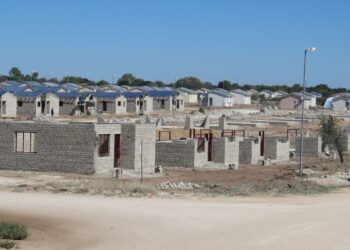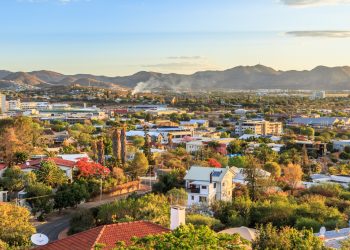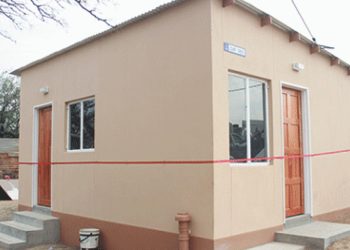
Namibia still has a long way to go to make housing more affordable for all, Minister of Urban and Rural Development Erastus Uutoni has said.
The Minister noted that the current minimum price of houses built under various housing programmes were out of reach for most people.
“Affordability of housing still remains an issue as the minimum prices of the houses is beyond affordability for most people. Let’s try to reduce the price a little bit so that people can afford it. Even as a minister I am paying for my house and this amount continuously increases as the repo rate increases and thus I can imagine how this affects the people who are working in the informal sector,” he said at the official handover ceremony of 8 pilot houses under the City of Windhoek Affordable housing programme on Thursday.
The price ranges for the houses inclusive of the erf are from N$850,000.00, (smallest erf size of 312m²), to N$1,2 million (largest erven size of 1022m²).
In addition, the typologies for the constructed houses are three bedroomed houses with a dwelling size of 94m2, named Nguni and a dwelling size of 91m2, named Brahman.
“While we recognise the many challenges faced by the City of Windhoek during implementation, the fact that we can all stand here and bear witness to the handover of 8 houses as part of the City of Windhoek’s Affordable Housing Pilot Project, is truly commendable. I therefore, want to express my utmost appreciation to the City of Windhoek for the stellar work you have accomplished in such a short space of time. I also have renewed hope and confidence in this project and look forward to handing over many more houses this year,” he said.
This comes after the informal settlement upgrading programme has delivered over 570 houses constructed by both the NHE and City of Windhoek in various informal settlements of Windhoek.
This is a custom made and deliberate approach to deliver affordable, decent houses for those with very minimal incomes.
Beneficiaries of the houses handed over today were part of the city of Windhoek waiting list which is currently going through digitalization.
City Senior Communications Officer, Lydia Amutenya, said the “list needs a proper clean up and categorisation as some people no longer qualify as their income might have elevated, they need to go through the market to find land, however we are aware how expensive this is and thus we are also categorising to determine what they can qualify for.”
Amutenya further noted that the current housing initiatives are earmarked for people who already own land and thus there is no room for the city to inflate the housing prices.
This comes as there are concerns that the city’s plans are mainly earmarked for the high-income earners.
“Remember when this project was launched, we are not into this for profit and what is happening is that the money that is coming in is a revolving fund that goes back into the project,” she said.
She said the target beneficiaries are people that are unable to afford houses in the formal market and inflating them means there will not be client’s.
Meanwhile, the city had various plans to avail housing for all under various projects that are underway and still to be launched.
One of the initiatives the informal settlement upgrading program where beneficiaries of the houses must be earning N$3500 and below, however they are required to already have a plot and the program will assist with the construction of a house only.
‘The focus is to help people who already have land and because of income , they are unable to build proper structures. The city has identified particularly informal workers such as domestic workers, street vendors to benefit from the informal settlement upgrading program,” said Amutenya.
The other initiative is the council affordable housing programme which is focused on low to middle income residents who earn an income from N$3500 to N$25000 monthly in formal areas and includes different housing typologies ranging from N$300 000 to N$650 000 excluding the land.
Amutenya noted that the beneficiaries are required to get bank approval.
Furthermore, the city has two more programmes, employer to employees housing programme that focuses on employer groups who wish to provide housing solutions to their employees.
This targets employers who have more than 10 employees.
The other programme is the Rent and rent to own housing programme that had two legs which is focused around council constructing houses for rental purposes where rental amounts will be lower than bonds installments.
The other leg focuses on residents whose economic status at the time may not permit them to purchase a property and they will enter into an agreement where they rent to own with the option to buy once their economic status has improved.
The last two programs are still yet to be launched by the City.
Meanwhile, the Shack Dwellers Federation has over the years had various projects that provided housing that was under N$2 000 000, a significant difference from the city’s current projects.
Uutoni says that this is not possible due various factors such as the need to maintain the standards to certain houses to fit into the location they are being constructed into.
He further said that with the federation, residents are more involved in the construction of houses and this has led to decreased spending on contractors.
Â











